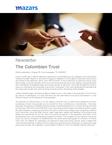
The Colombian Trust
A few months ago I had the pleasant experience of accompanying my colleague and friend Jesús Orlando Corredor Alejo to a conference he gave in Medellín on the subject of business structuring in the context of the latest tax reform (Law 1819 of 2016). In this conference he referred, among many other things, to the tax benefits of the use of commercial trusts when their settlors and beneficiaries were individuals not obliged to keep accounting records. It was there -and under that specific context- where he referred to the Colombian trust as the "Colombian Trust" and highlighted the benefits that this instrument would have, both for doing business and for structuring family estates.
I believe that this topic should be studied in depth, since, in the midst of the expiration of the income tax returns of individuals, it is clear that there are few alternatives to structure businesses in a tax efficient manner for this segment of the population.
The general rule that prevails in our tax system is that the use of autonomous estates to structure businesses should not generate any tax benefit for their constituents or beneficiaries. That was, precisely, the purpose of establishing the principle of fiscal transparency in commercial trust contracts through laws 1607/2012 and 1819/2016, since, according to this principle, the effect should be exactly the same between conducting a business through an autonomous estate, than conducting it without such instrument, since the total income, costs, expenses, assets and liabilities of the autonomous estate are transferred line by line, and in the same tax period, in the proportion that each of the beneficiaries has in the corresponding investment vehicle. The exception to such general rule (since every rule has an exception) is established by the same second paragraph of numeral 2 of Article 102 of the Tax Statute for individuals not required to keep accounting records, when it states that "when the beneficiaries or settlors [of the autonomous patrimony] are individuals not required to keep accounting records, the realization rule provided in Article 27 of the Tax Statute shall be observed".
It must be remembered that such special realization rule indicates that "for taxpayers not obliged to keep accounting records, income is understood to be realized when it is effectively received in money or in kind, in a form that is legally equivalent to a payment (...)".
Thus, the same tax regulation creates a possibility to defer taxation on income received by an autonomous patrimony whose beneficiaries are individuals not required to keep accounting records, as long as the autonomous patrimony does not make actual payments to its beneficiaries. The same would not be taxed on such income either, since the autonomous patrimony is only taxed at the corporate rate when the trust "is subject to suspensive or resolutory conditions or to substitutions, revocations or other circumstances that do not allow the identification of the beneficiaries of the income".
In this sense, it is evident that the autonomous patrimony is an attractive alternative to structure businesses where the beneficiaries are individuals who are not obliged to keep accounting records.
Likewise, the autonomous patrimony turns out to be an interesting vehicle to structure family estates, especially when, through them, they have investments abroad.


